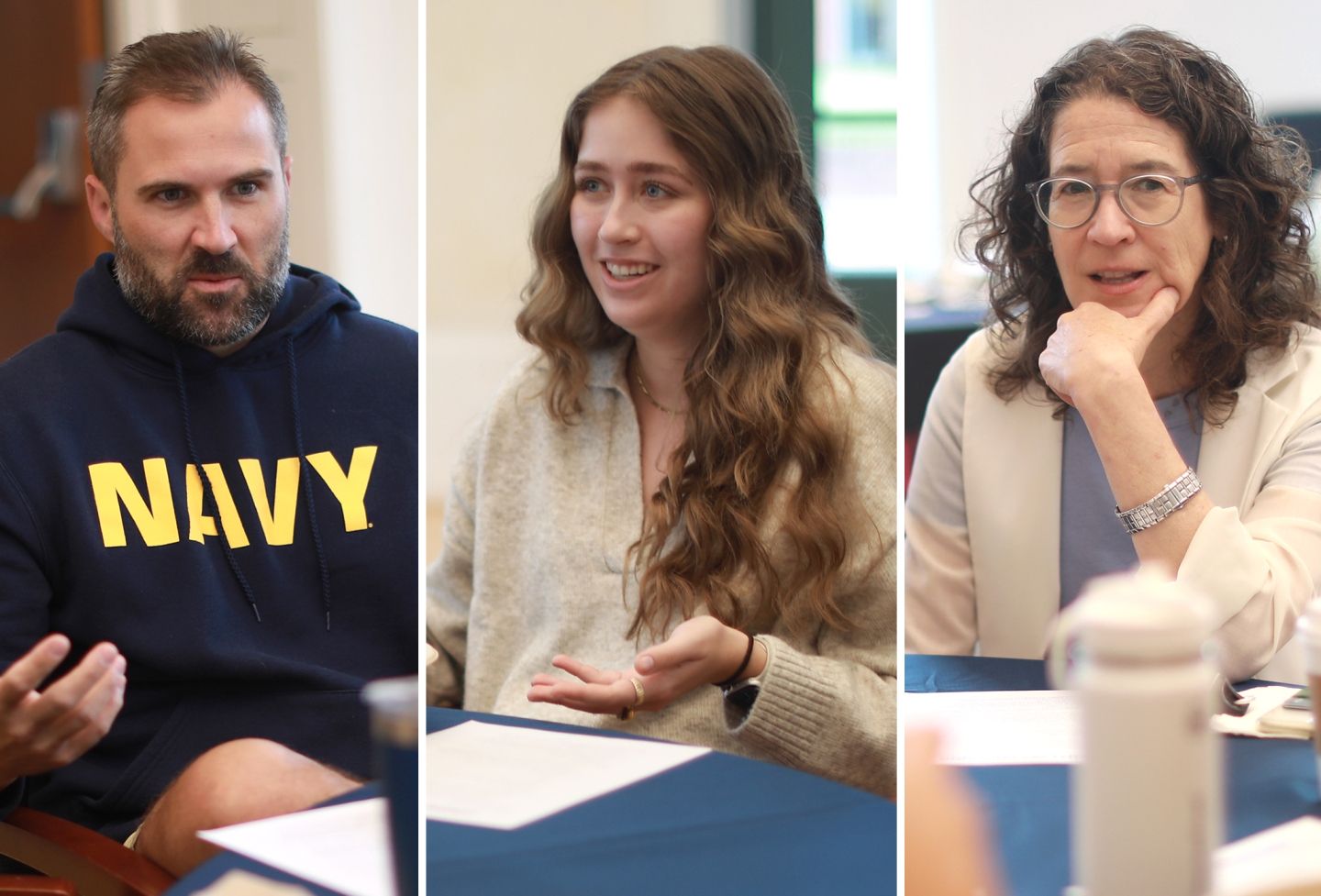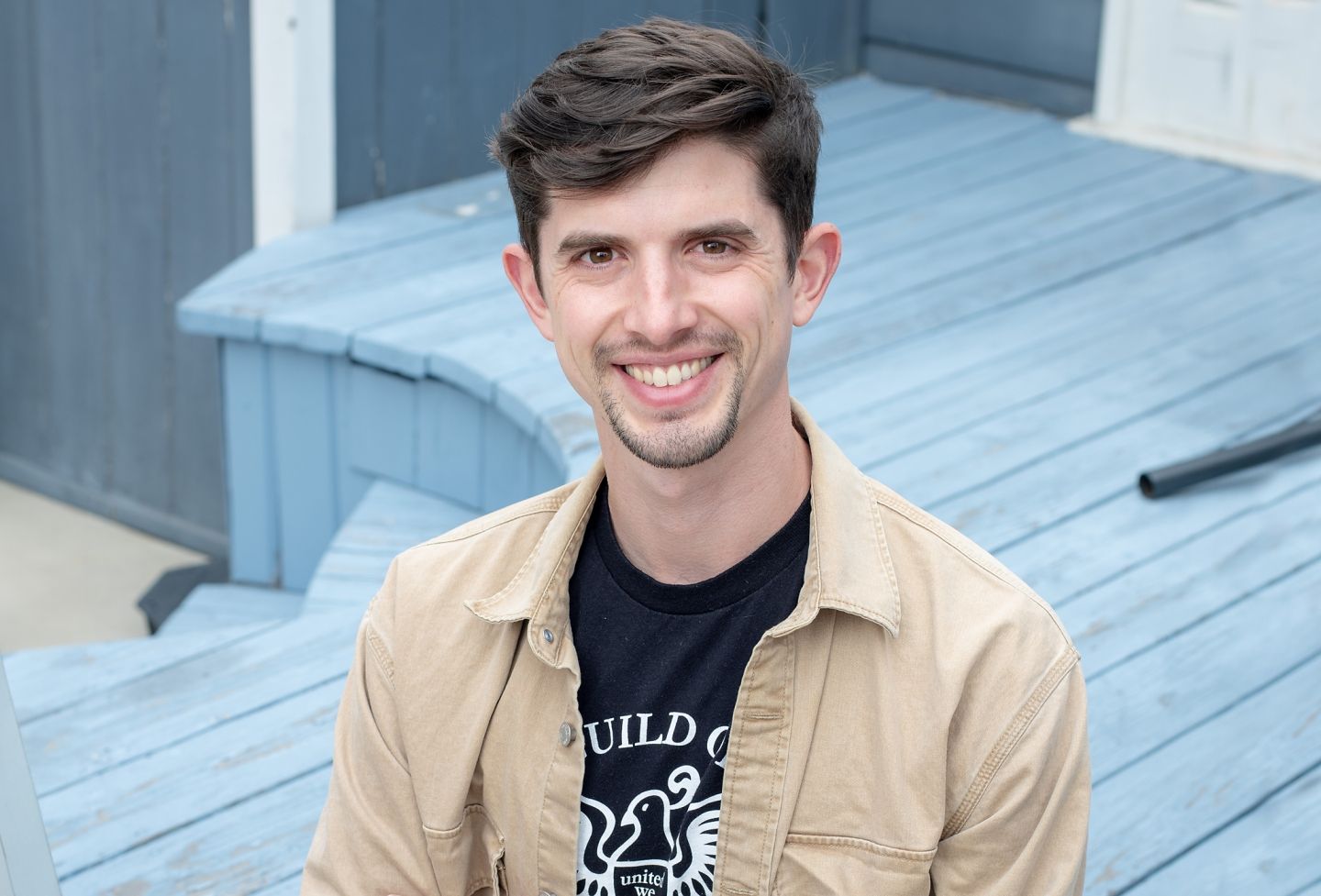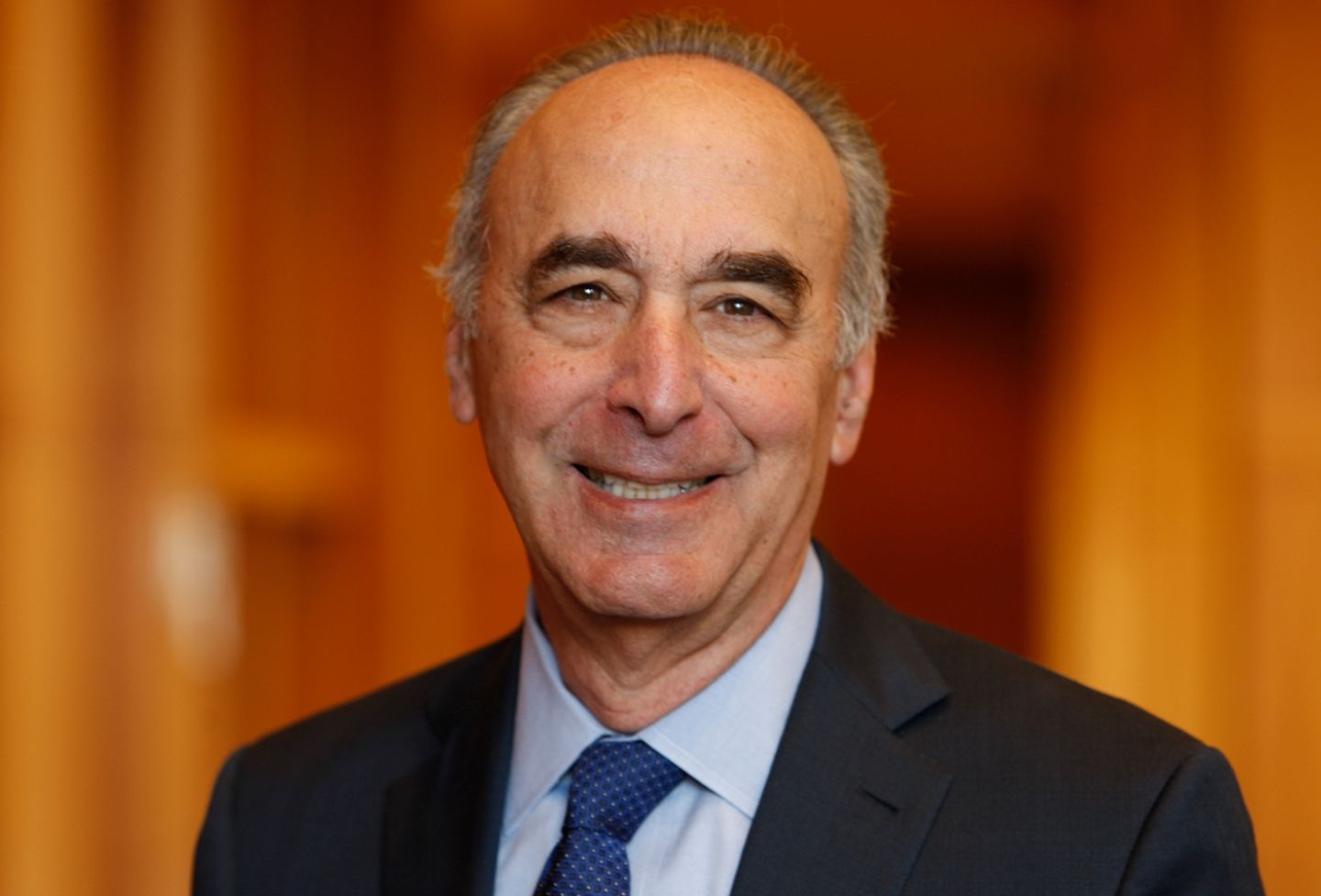As new students packed into Caplin Auditorium for the Law School’s orientation Aug. 17, Assistant Dean for Admissions Natalie Blazer ’08 delivered both a welcoming message and a reality check. She told them they would sometimes experience disagreement and discomfort during law school — because that experience is central to practicing law.
“Being a lawyer is about disagreeing all the time, but respectfully and with the goal of understanding, and that’s what we teach you how to do here at Virginia,” Blazer said. “When opposing counsel gets up and gives their opening statement, are you going to stand up and say, ‘Your honor, opposing counsel is making [me] really uncomfortable right now — they really shouldn’t be here’?”
The line evoked laughter and likely self-reflection among the 300-plus students newly admitted to a school famous for its collegial atmosphere. But with political friction high nationally, that collegiality can’t be taken for granted. To foster a sense of inclusiveness and compassion while maintaining its commitment to free expression, Law School administrators, faculty and student leaders in recent years have implemented a number of formal and informal policies, practices and programs to ensure North Grounds is a place where diverse and conflicting ideas and viewpoints flourish.
At the helm of these efforts is Leslie Kendrick ’06, who is a Kentuckian by birth, a Rhodes scholar by training and a UVA lawyer and professor by choice. With her master’s degree and Ph.D. from Oxford in English literature, she knows all the classics and can talk Milton with the best of them.

The classic she knows best today, however, is the First Amendment to the U.S. Constitution.
Her work focuses on freedom of speech and torts and has appeared in the Harvard Law Review, Yale Law Journal, Columbia Law Review and many other publications. Since 2020, she has served as faculty director of the school’s Center for the First Amendment, which elevates and promotes faculty scholarship in that field and sponsors events that draw on such scholars.
Kendrick serves as a special adviser to the University’s provost regarding free expression and inquiry, and in 2021 chaired the committee that produced the University’s Statement on Free Expression and Free Inquiry, which was endorsed by President Jim Ryan ’92 and adopted by the Board of Visitors. At the Law School’s second day of orientation, Kendrick read the statement to the students as part of a session on the First Amendment and free speech policies at the school. As Kendrick noted, the statement emphasizes the University’s unique connection to the Founding Fathers and freedom of speech:
Academic commitment to free inquiry reflects the view that every idea must be heard so that it may be subjected to the rigorous scrutiny necessary to advance knowledge. This process requires deep critical engagement, as well as humility in the recognition that many commonly accepted views have proved mistaken, while many ostracized views have illuminated the path toward truth.
The University of Virginia has a unique connection to principles of free expression and inquiry. James Madison introduced the Bill of Rights, including what is now the First Amendment, as a member of Congress representing the district that would become home to the University. James Madison and Thomas Jefferson’s Virginia and Kentucky Resolutions were among the earliest extended interpretations of the First Amendment, which, as the Supreme Court observed years later, “carried the day in the court of history” and “first crystallized a national awareness of the central meaning of the First Amendment.” Jefferson’s vision for the University included the aspiration that “here we are not afraid to follow truth wherever it may lead, nor to tolerate any error so long as reason is left free to combat it.” …
The statement goes on to note that the University’s commitment to free expression also arises from its status as a state institution; by virtue of it being an arm of the state, it is obligated to uphold the Constitution.
Kendrick used the rest of the session to give the students their first lesson in the difference between law, policy and norms, as well as how to interpret legal language and the intent behind it.
“Generally speaking, as students, you are not bound by the First Amendment, but the faculty and staff are,” Kendrick said. “It means that University policy and the actions of University employees have to be viewpoint- or content-neutral. … Basically, our decision[s] should not be based on the message of what speech is saying, unless it’s one of [a] very, very narrow [group of] exceptional categories that’s not protected.”
Those categories of unprotected speech, she said, include incitement to violence, defamation, threats, violations of privacy, intellectual property infringement, stalking, harassment, unlawful discrimination, conspiracy and criminal solicitation. “There are various examples, but these are defined by the law, not by individual preferences,” she said.
“The idea is that we protect all expression of ideas, not because all ideas are created equal, but because they are not,” Kendrick said. “You are here to learn. Part of that is asking questions; part of that is putting forth propositions that you may or may not believe, but that you want to discuss, [and] it happens not just in the classroom, but also at events with speakers outside the classroom, in conversations between students outside the classroom, and in scholarship and research that your professors are undertaking and that you can help with as research assistants and co-authors.”
Students who disrupt the school’s operations and events, or jeopardize others’ safety or property, face possible disciplinary charges, arrest or criminal charges, all of which may be required disclosures on their bar applications, Kendrick said.
Nor should students expect Law School administrators to intervene or punish other students who post offensive material on social media or even say offensive things on Grounds. “That is not what public institutions do. That’s not what universities do,” Kendrick said. “It’s not what law schools do, and it’s definitely, definitely, not what public law schools do.”
What a law school like Virginia does do is “try to create a community that models what we want to see in the world, including modeling sincere and authentic discussion of important issues and treating people like a neighbor rather than treating them like an enemy, even when you disagree with them,” Kendrick noted.
Kendrick added later in an interview that talking about what free speech means at Virginia during orientation “is good for setting expectations and for making that distinction between ‘Here’s what the rules are’ and ‘Here’s where everybody has a role to play in setting what the norms are.’”
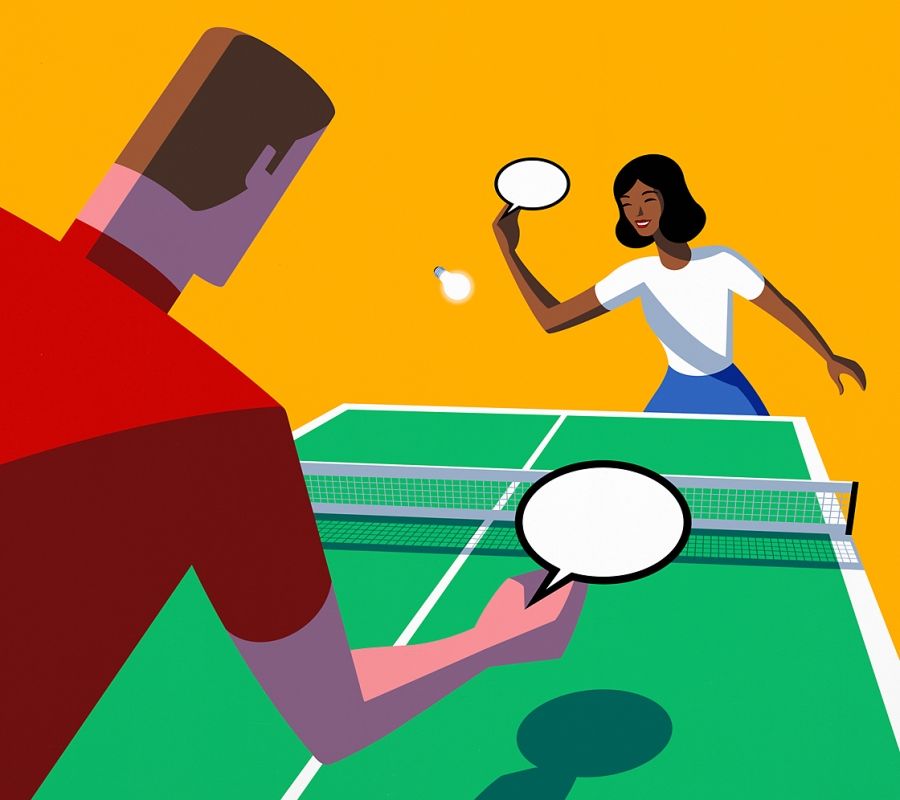
WHEN NEW STUDENTS head into classrooms, apartments and ball fields at UVA, they continue to learn how to, as Kendrick put it, “go hard on ideas but easy on people.” Students participate in exchanges every day that foster the practice of talking across differences (see p. 39), and the leaders of student organizations attend retreats focused on finding common ground (see sidebar, A Conversation With Mark Jefferson). Meanwhile, their professors train and engage in thinking about how to foster productive and civil classroom discussions, including through faculty workshops where they collaborate about how to respond to challenges they’ve encountered.
The Law School has created a website about free expression on Grounds, gathering all of the policies, guidance and resources into one place. The website articulates the school’s values and highlights how the free exchange of ideas furthers the school’s mission.
Throughout it all, students are supported by Mark C. Jefferson, the assistant dean for community engagement and equity. In his role, which is similar to the position he held at Harvard Law School until 2021, Jefferson leads the school’s Committee on Community Engagement and Equity, and is a resource for faculty, staff and students to ensure that the curriculum, classrooms, clinics and programs are equitable and allow students opportunities to flourish and succeed as individuals and as members of the Law School community. He facilitates “opportunities for real engagement and the open and respectful exchange of ideas across difference,” as he put it.
Peter Lee Hamilton, a conservative student in his final year of a joint J.D./MBA program, first approached Jefferson during his second year at the Law School, feeling both curious and a bit dubious about Jefferson’s role.
“I think a lot of people are a little bit hesitant to engage because of the connotations associated with his role and the emotional baggage attached to it in the culture right now,” said Hamilton, a member of the Federalist Society and Law Republicans. “But my first interaction with him was just walking into his office, sitting down and talking about philosophy for two hours.”
Jefferson, who majored in philosophy and considered pursuing theology, finds himself engaging with and counseling students from across the political spectrum.
“I’m pretty much a free-speech absolutist,” Jefferson said. “The answer to difficult speech is more speech and, working with lawyers in the making, I’ve become very clear about the extent to which I value expression.”
In the academic space, Jefferson said, “We tend to conflate ‘rights’ and ‘norms,’ and it’s an important distinction. We can articulate rights—you have a right to be offensive. You get to say what you want—that’s your right—but I get to say that’s offensive to my sensibilities.”
The bigger question to Jefferson is, “Who gets to determine the norms? That’s a much more multivocal conversation than it has ever been in our country, and that’s a good thing. Once we are clear about everyone’s rights, we can get down to the much more difficult work of establishing norms by which we live together.”
Through multiple initiatives, Jefferson and Hamilton both hope to encourage students to think more intentionally about this relationship between rights and norms, and to help students across the spectrum get to know each other as whole people. In the spring of 2022, Hamilton co-founded the Fun Club, a group that brings together students from across the political spectrum to realize one common goal: to support Virginia’s varsity teams by attending at least one event for each sport before graduating.
“Sports is one of the few things that hasn’t been polarized yet,” Hamilton said. “As humans, we tend to limit our circles to people who think like we do, but then you don’t know who your neighbors are and what they think, and you don’t get to engage with people who are nice, normal people who just happen to hold significantly different views than you.”
Hamilton, Jefferson and Shivani Arimilli ’23 organized a “law presidents summit” to bring together for discussion the incoming and outgoing presidents of every student organization across the political spectrum.
With apologies to Lin-Manuel Miranda: Hamilton and Jefferson together planned the menu, the venue and the seating for the room where this happened. “We sat all the faith groups down at the same table for the dinner, and they were able to have a good conversation, get to know each other, share their contact information and start a group chat,” Hamilton said. “That’s the kind of thing we’re trying to foster.”
By agreeing to protect the process of free speech here on Grounds, Jefferson said he believes these future leaders can learn how to protect democracy and the rule of law. “We’re in a fractious moment. We need to talk more, not less,” Jefferson said. “If lawyers are incapable of listening to all points of view—especially the ones that you have the most vehement disagreements with—then who can? We would be lost.”
Julia “JJ” Citron is a third-year student leader who, as co-director of programming for the liberal-leaning UVA Law student chapter of the American Constitution Society for Law and Policy, has also worked with Jefferson to bridge divides in the student body—including between ACS and the conservative-leaning Federalist Society.
“He’s supportive of, for example, paying for a dinner where members of the boards of both organizations share a meal together,” Citron said. “That’s something that I’m personally interested in exploring, and it’s opt-in, which is appreciated.”
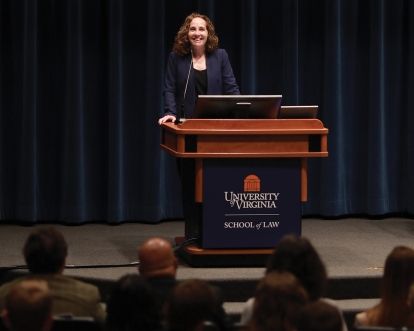
Citron noted that the transition to law school discourse, where topics naturally have heavily political undertones and real-life consequences, can be jarring for some—particularly if one’s pre-law school years were spent in like-minded siloes.
“These conversations continue outside of the classroom, and you can’t run away from these discussions,” Citron said. “I had been in very specific liberal Democrat spaces, so I really appreciate UVA having diversity of thought and events that foster people from different backgrounds coming together. It’s so important to be able to work across the aisle and talk to people of different beliefs.”
IN HER OWN ORIENTATION REMARKS, Dean Risa Goluboff delivered much of the same message about how central facilitating the free exchange of ideas is to the Law School’s mission. She noted that school administrators can’t achieve that mission alone, and exhorted incoming students to join in efforts to engage with one another and create new opportunities to do so, just as Hamilton and Citron have.
“We are always looking for ways to foster the kind of community and belonging in which the free exchange of ideas can truly occur,” Goluboff said. “But we, the Law School, the administrators, can’t do that for you. We can articulate the value of a diverse and inclusive community and create the conditions for it. We can articulate the value of the free exchange of ideas and create the conditions for it. But it is up to each one of you and each member of this law school community to sustain that community and to engage in that exchange.”
More in This Series
A Conversation With Mark Jefferson
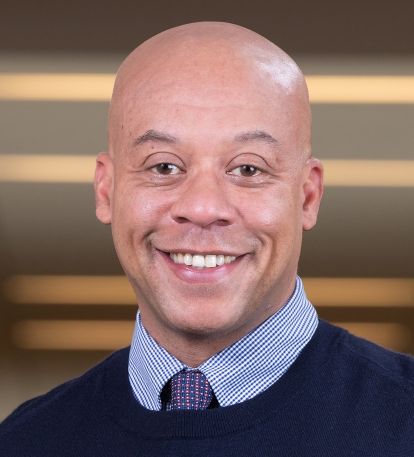
As the Law School’s assistant dean for community engagement and equity, Mark C. Jefferson works to strengthen and advance the school’s commitment to creating an equitable environment where everyone is provided the support that allows them to flourish and succeed as individuals and as members of our community. His work creates opportunities for engagement and the exchange of ideas across differences.
Once the isolation caused by COVID-19 ended, Jefferson found himself counseling students who had lost more than a year of socializing with others and were suddenly facing profound division on numerous fronts—abortion, affirmative action, LGBTQ+ rights, electoral politics and more.
When did you first sense that students were finding engagement challenging?
I’m 53 years old, and I’ve never felt the country so divided as now. We’re a part of the country—this is a natural extension of that. But I started working in law schools in 2014, so I can say it’s been in the water for a long time. It probably reached a tipping point during the pandemic, when you couldn’t build successful social networks. The students here are collegial—that’s the culture. And that always requires work.
You have held conversations with every Law School student group. What have they said about the free exchange of ideas on Grounds?
Every single group imagines that there’s a mainstream that polices what you can say and how you can say it. And every group—the Black students, the conservative students, the Mormon students, the queer students, the softball players—thinks they are outside of the mainstream and the dominant narrative. This is all within their own social interactions with each other, not in relation to the administration. It’s very easy in this moment to focus solely on one group of students and their challenges and lose sight of the commonality of challenges faced across groups. But if we take a step back, you realize that we are having a devil of a time getting to know each other across our social identities, and in some ways, we are having an even harder time getting to cultivate our individuality within our various social identities. In other words, groupthink is real, and our students struggle mightily against it across groups and within groups.
Why is it important to keep talking to people who will never agree with you?
If you treat the other side as though they’re irredeemable and can’t be listened to, eventually the other side is going to turn you off—if I’m irredeemable, there’s no need for me to talk to you. And that insistence on purity also feeds on its own, eventually chasing out people who do agree with you.
But for us to maintain our constitutional republic as we understand it, it’s not enough to engage in good-faith exchange across political commitments—we also have to think critically about the limitations of the political commitments that animate us. So I’m probably harder on students who share my political sensibilities than on the ones who don’t. I’d consider myself to hold progressive political commitments, but if you don’t think Edmund Burke has anything worthwhile to say about traditions and continuity, that doesn’t even strike me as consistent with what human beings are like. Burke has lots to say to us about being a human being that is important, as does Fyodor Dostoevsky or Richard Weaver or Friedrich Hayek—three of many important conservative or classically liberal thinkers that we would all, regardless of our political commitments, benefit from wrestling with.
What sorts of activities and programs do the Law School and your office arrange to foster open dialogue and collegiality?
It’s in the way we run our classes, how we communicate our policies and how we plan events to engage the full spectrum of ideas. First off, it’s foundational to law school pedagogy and the way classroom discussions are structured. It’s also in how we interact with students every day. In most of my interactions with students, I attempt to be interrogative more than declarative, or worse, didactic. I’m interested in pushing our students to think carefully and critically for themselves about whatever topic is under discussion, whether it’s a school policy question, engaging with views different from your own, or learning how to dissent within one’s own group and push back against what’s taken to be the popular or “correct” way of thinking about an issue. For my part, I’ve done “leadership journeys” with the leaders of the affinity organizations, the Federalist Society and the American Constitution Society. We did a ropes course together to start the year, then a dinner together to discuss a book on leadership styles, then we did a service project together at the Ronald McDonald House. Then we reversed it, and we bowled together, did another service project together, and had another dinner together. The goal was just to create opportunities for them to be in community and conversation with each other, with the hope that they could see their similarities as leaders underneath their differences as members of [disparate] groups.
We’re working with the Student Bar Association to do a series of talks—kind of like TED Talks for students—where students are invited to speak for eight to 10 minutes about some part of their lives you might not otherwise know. My one rule is that they make sure they have the broadest possible array of speakers, and that they’re sharing stories, not resumes.
One of the great tragedies of life, to paraphrase W.E.B. Du Bois at the end of “The Souls of Black Folk,” is that we don’t truly know one another. Hopefully, through this speaker series they can find more intimate ways to get to know each other’s stories.

